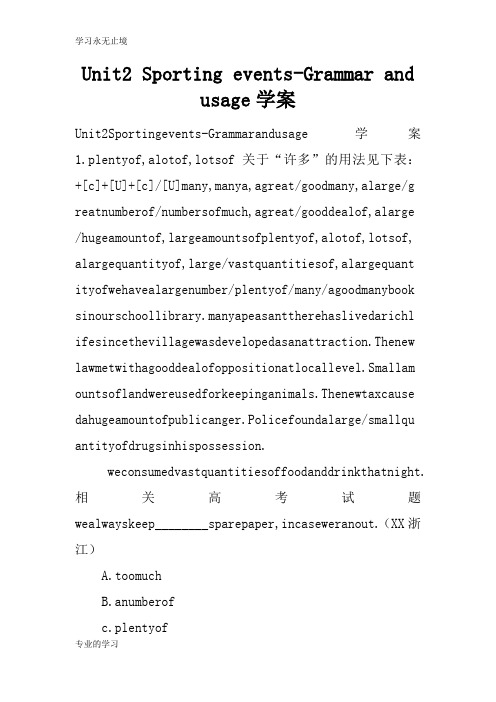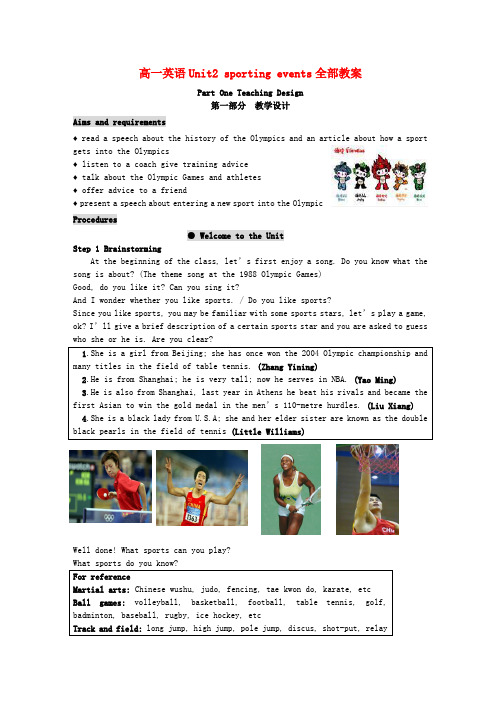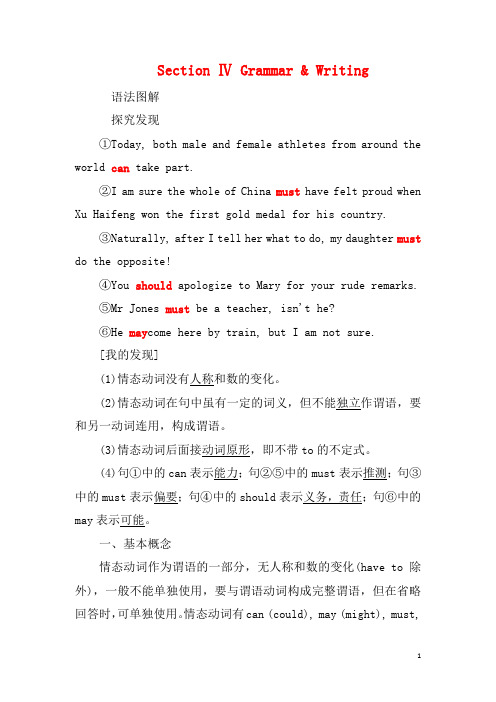英语:unit2《sporting-events》grammar-and-usage课件-(1)(译林牛津版必修4)
- 格式:ppt
- 大小:993.00 KB
- 文档页数:28

Module 4 Unit2 Grammar and Usage-----Modal Verbs教学设计一.教学内容分析本课是牛津高中英语必修教材Modal 4 Unit2 Sporting Events 中的Grammar and Usage(语法与运用)。
本单元的语法项目是情态动词。
情态动词在初中课程中就出现过,情态动词的用法复杂又繁多,比较零散,这些特点都给学生学习情态动词的用法造成一定的困难。
基于以上特点,本课时通过语法规则的讲解与呈现,让学生比较全面系统地掌握情态动词的语法知识。
通过本节课的教学,学生能够首先了解情态动词的基本特征和在句子中表达各种语气的功能,其次,学生能够系统掌握情态动词的基本用法,并在口语和书面表达上能够更加准确、流畅地表达自己。
二.学生学习情况分析情态动词在初中课程中就出现过,学生对于情态动词的基本概念和知识已有一定的基础。
但是,由于情态动词的用法复杂又繁多,在实际教学中教师往往是花费了大量精力时间将情态动词的用法逐个讲解并设计练习题让学生进行操练,学生在依然是一头雾水。
究其原因,主要是学生一味被动地接受并识记教师所教授的情态动词用法,对于情态动词多而杂的用法未进行归纳总结,对于部分情态动词的用法掌握不全面,以致于对于情态动词的用法掌握陷入混乱的状态,就如有位老教师曾经这样一个成语描述学生学习情态动词的状况-----为“情”所困。
三.设计思想首先,“四段式”教学模式的指导思想要使学生“动”起来。
建构主义学习理论认为教学不是通过教师向学生单向传递知识就可以完成的,知识不只是通过教师传授得到的,而是学习者在一定的情境即社会文化背景下,借助其他人(包括教师和学习伙伴)的帮助,利用必要的学习资料,通过“意义建构”的方式而获得的。
教师不能直接将知识传递给学生,而是要组织、引导,使学生参与到整个学习过程中去。
其次,综观历年高考英语情态动词的考查情况,有相当一部分考题从本质上看都是考查情态动词在具体语境中的运用。

Unit2 Sporting events-Grammar andusage学案Unit2Sportingevents-Grammarandusage学案1.plentyof,alotof,lotsof关于“许多”的用法见下表:+[c]+[U]+[c]/[U]many,manya,agreat/goodmany,alarge/g reatnumberof/numbersofmuch,agreat/gooddealof,alarge /hugeamountof,largeamountsofplentyof,alotof,lotsof, alargequantityof,large/vastquantitiesof,alargequant ityofwehavealargenumber/plentyof/many/agoodmanybook sinourschoollibrary.manyapeasanttherehaslivedarichl ifesincethevillagewasdevelopedasanattraction.Thenew lawmetwithagooddealofoppositionatlocallevel.Smallam ountsoflandwereusedforkeepinganimals.Thenewtaxcause dahugeamountofpublicanger.Policefoundalarge/smallqu antityofdrugsinhispossession.weconsumedvastquantitiesoffoodanddrinkthatnight.相关高考试题wealwayskeep________sparepaper,incaseweranout.(XX浙江)A.toomuchB.anumberofc.plentyofD.agoodmany答案:c2.suggestsuggestvt.1.tomentionanidea,possibleplano ractionforotherpeopletoconsider:e.g.:TheywerewonderingwheretoholdtheofficepartyandI suggestedtheItalianrestaurantnearthestation.FoRmALmightIsuggestawhitewinewithyoursalmon,sir?[+]Isuggestwewaitawhilebeforewemakeanyfirmdecisions.LizsuggestedItrytheshoponmillRoad.[+ingformofverb]I suggestedputtingthemattertothecommittee.Hesuggestedourstartingoffearlier/thatweshouldstarto ffearlier.[+questionword]canyousuggestwhereImightfi ndachemist's?suggestionn.[corU]e.g.:Idon'tknowwhattoweartonight-haveyougotanysugge stions?Shemadesomeveryhelpfulsuggestionsbutherbossrejected themall.[+that]Theydidn'tlikemysuggestionthatweshouldallsha rethecost.IhaveafewfavouriterestaurantsthatItendtogobackto,bu tI'malwaysopentonewsuggestions.IwenttotheParkStreetdentist'satAnn'ssuggestionandIw asreallyimpressed.suggestvt.2.tocommunicateorshowanideaorfeelingwithoutstatingitd irectlyorgivingproof:e.g.:[+]There'snoabsoluteproof,butalltheevidencesug gestshe'sguilty.AreyousuggestingIlookfatinthesetrousers?Somethingabouthismannersuggestedalackofinterestinwh atweweredoing.Hissadlooksuggestedthathehadn’tpassedthetextagain.proposevt.1.toofferorstateapossibleplanoractionforotherpeo pletoconsider:[+that]Iproposethatwewaituntilthebudgethasbeenannou ncedbeforecommittingourselvestoanyexpenditure.[+ingformofverb]Heproposeddealingdirectlywiththesup pliers.Sheproposedaboycottofthemeeting.Heproposedamotionthatthechairmanresign.2.tosuggestsomeoneforapositionorformembershipofanor ganization:Tobenominatedforunionpresidentyouneedonepersontopro poseyouandanothertosecondyou.proposaln.[c]asuggestion,sometimesawrittenone:congresshasrejectedthelatesteconomicproposalputforw ardbythepresident.[+toinfinitive]Therehasbeenanangryreactiontothegove rnment'sproposaltoreduceunemploymentbenefit.HaveyoureadSteve'sproposalsforthenewproject?[+that]TherewasangerattheproposalthataUNpeacekeepin gforceshouldbesenttothearea.advisevi.&vt.1.togivesomeoneadvice:[+toinfinitive]IthinkI'dadvisehimtoleavethecompany.Hisdoctoradvisedhimagainstsmoking.I'dstronglyadviseagainstmakingasuddendecision.[+that]They'readvisingthatchildrenbekeptoutofthesun altogether.[+ingformofverb]I'dadvisewaitinguntiltomorrow.[+questionword]Sheadviseduswhentocome.SheadvisesthePresidentonAfricanpolicy.youwouldbewell-advisedtohavetheappropriatevaccinati onsbeforeyougoabroad.advicen.[U]anopinionwhichsomeoneoffersyouaboutwhatyoushoulddoo rhowyoushouldactinaparticularsituation:Stevengavemesomegoodadvice.IthinkI'lltakeyouradviceandgetthegreendress.canIgiveyouapieceofadvice?Ineedsomeadviceonwhichcomputertobuy.[+toinfinitive]myadviceistogobytrain.wewenttoParisonSarah'sadvice.第二部分:练习1.Haveagoodrest,youneedto____yourenergyforthetennis matchthisafternoon.A.leaveB.savec.holdD.get2.Herson,towhomshewas______,wentabroadtenyears ago.A.lovedB.caredc.devotedD.affected3.maryfinally____Bruceasherlife-longcompa nion.A.receivedB.acceptedc.madeD.honored4.–whenshallwestart?--Let’s____it8:30.Isthatallright?A.setB.meetc.makeD.take5.Becarefulwhenyoucrossthisverybusystreet.Ifn ot,youmay____runoverbyacar.A.haveB.getc.becomeD.turn6.Hospitalstaffburstintocheersafterdoctorscom pleteda20-houroperationtohave____one-year-oldtwinsa tthehead.A.isolateB.separatedc.dividedD.removed7.Aftertrainerwassurethatthewhalecouldlook afteritself,he____itintothesea.A.transportedB.unloadedc.releasedD.handled8.Theteacherwroteanexampleontheblackboardt o_____thepoint.A.tookupB.caughtonc.carriedoutD.madefor9.Amanisbeingquestionedinrelationtothe____ _murderlastnight.A.advisedBattendedc.attemptedD.admitted10.Inourchildhood,wewereoften____byGrandm atopayattentiontoourtablemanners.A.demandedB.remindedc.allowedD.hoped11.modernplasticscan_____veryhighandverylowt emperatures.A.standB.holdc.carryD.support12.–wow!I’veburntmymyself!--Howdidyoudothat?A.touchedB.keptc.feltD.hold13.Ifastudentisindeedwise,heorsheshouldnotent erthehouseoftheteacher’swisdom,but____gototheworldofhisorherownmind.A.justB.otherwisec.onlyD.rather14.Theenvironmentalistssaidwildgoats’____onthevastgrasslandswasagoodindicationofthebette renvironment.A.escapeB.absencec.attendanceD.appearance15.Don’tleavematchesorcigarettesonthetablewithin____oflitt lechildren.A.handB.reachc.spaceD.distance第二部分:练习答案1.Bsaveone’senergy 意为“积蓄力量”,从前文的“haveagoodrest”可以推出下文应选用能表达这一含义的短语。

号顿市安谧阳光实验学校Grammar: Modal Verbs 所谓情态动词是指它含有一定的含意.可以表达某种感情和说话的口气,但是它不可以单独使用作谓语动词。
情态动词有:can(could),may(might),must(must),have to,shall(should),will (would),need(need),dare(dared),ought to情态动词无人称和数的变化.不能使用;它与其后面的动词原形合成谓语。
情态动词的具体用法如下:一、can和could的用法1.表示能力或客观可能性,还可以表示请求和允许。
e.g. Can you finish this work tonight?Man cannot live without air.Can I go now? Yes,you can.注:1、could也可表示请求。
语气委婉.主要用于疑问句.不可用于肯定句,答语应用can,即:could不能用于现在时态的简略答语中)。
e.g. Could I come to see you tomorrow?Yes, you can(否定答语可以用No, I’m afraid not).2、can表示能力时,还可用be able to代替。
e.g. I’ll not be able to come this afternoon.can只能用于一般现在时和一般过去时(could)的句子中,be able to可以用在任何时态中can只表明具备某种能力.但不一定做了,可be able to 不仅具备了某种能力.而且还实际实施了。
2. 表示惊异.怀疑,不相信态度。
(主要用在否定旬、疑问句或感叹句中)e.g. Can this be true? How can you be so careless!This cannot be done by him.3、can (could) + have + 过去分词”的疑问或否定形式表示对过发生的行为怀疑或不肯定。


Section Ⅳ Grammar & Writing语法图解探究发现①Today, both male and female athletes from around the world can take part.②I am sure the whole of China must have felt proud when Xu Haifeng won the first gold medal for his country.③Naturally, after I tell her wha t to do, my daughter must do the opposite!④You should apologize to Mary for your rude remarks.⑤Mr Jones must be a teacher, isn't he?⑥He may come here by train, but I am not sure.[我的发现](1)情态动词没有人称和数的变化。
(2)情态动词在句中虽有一定的词义,但不能独立作谓语,要和另一动词连用,构成谓语。
(3)情态动词后面接动词原形,即不带to的不定式。
(4)句①中的can表示能力;句②⑤中的must表示推测;句③中的must表示偏要;句④中的should表示义务,责任;句⑥中的may表示可能。
一、基本概念情态动词作为谓语的一部分,无人称和数的变化(have to除外),一般不能单独使用,要与谓语动词构成完整谓语,但在省略回答时,可单独使用。
情态动词有can (could), may (might), must,have to, shall (should), will (would), dare (dared), need (needed), ought to等。
二、基本用法1.can (could)(1)表示能力,can表示现在的能力,could主要指过去的能力。

Unit 2 Sporting events语言点及语法精解词汇honorable adj.可敬的, 荣誉的, 光荣的ex:虽然做一个清洁工是受人尊敬的工作,许多却不愿做。
n. 敬重,尊敬;被引以为荣的人物, 荣誉,名誉;信用所有的运动员都竭尽全力为祖国争光。
他的父母以他为荣。
vt. 受到尊敬他因在战斗中的英勇表现而受到尊敬。
有用句型:in honor of/in one’s honor为纪念,为庆祝;我举行了一个特别晚会向我们的来客表示敬意。
相关链接:show honor to对某人表示敬意;have the honor to do很入荣幸地feel honored to do因做……而感到荣幸;on one’s honor以某人的名誉担保games n.game则指有一定规则的,双方竞争的游戏或运动,既可以是体力运动,也可以是脑力劳动,以输赢为主要目的。
而sport指户外游戏或运动,仅限于体力锻炼,包括娱乐性的及竞赛性的;不以胜负为目的。
sports和games都表示“运动会”,但有大、小之分,如school sports(校运会),the Asian Games(亚运会),the Olympic Games(奥运会)delight n.乐趣;喜悦;欣喜adj. delighted欣喜的, 快乐的我很高兴被邀请参加她的晚会。
vi.(常与in连用)热衷于;引以为乐她以烹饪美食为乐。
significance n.重要;意义;价值这个会议有什么意义?adj. significant 有意义的, 重大的, 重要的这个会议有意义vi. compete竞争;竞赛Five children competed in the race.五个孩子参加赛跑。
n. competition 竞争;竞赛在现代社会求职的竞争十分激烈n. competitor 竞赛者;对手take part in . 参加活动。
All the students in our class took part in the sports meeting which was held in our school every other year . 我们班全体同学都参加了学校每年一次的运动会。
M4U2-Grammar and usage设计思想:通过对情态动词的各种基本功能的解释,帮助学生理解情态的作用,让他们能更好的去理解各种表达的含义,同时配以相对应的练习,来进一步对他们的所学进行检查。
Teaching Aims:1. Learn that modal verbs can be used to talk about ability, obligation, certaintyor permission, to make requests, suggestions, offers and to give advice.2. Help students compare similar modal verbs.3. Enable students to learn that some modal verbs can be used with the continuousform and the perfect form to talk about current affairs or past actions.4.Learn to use modal verbs with exercises.Teaching Important Points:1、Develop the students’ ability of using modal verbs.2、How to make students master the usage of modal verbs.Teaching Difficult Points:Develop the students’ ability of using modal verbs and how to make studentsmaster the usage of modal verbs.1.The multimedia2.The blackboard【教学环节】Step 1 DictationHave a dictation of the new words, phrases and sentences in the part ofReading text.【课堂导入】Step 2 Lead in: provide some daily life situations and ask students to fillin the blanks using proper modal words1.A: Who ________ it be? (can)B:It _____________ be Tom. (may/might)A: No. It _______ be Tom, because he flew to Shanghai this morning.(can’t) B:OK. It ________ be Jack. He promised me to come here this moment.(must)2.---May I come in?--- Yes, you ______________. (may/can)--- No, you ______________.(mustn’ t)3.---Must I do it now?---Yes, you ________________. (must/have to)--- No, you ________________.(needn ’ t)4. You ________________ eat a lot before swimming.(shouldn ’ t/oughtn ’t to)5. You __________ use this toothbrush. It ’ s mine.(shall not)6. Children ____________ play with cats. They ________ hurt you. (mustn ’ t; may)1.What is a modal verb?2.How many modal verbs do you know? Make a list.3.情态动词两大类用法:不表示推测;表示推测Step 4 Explanation Grammar --- Modal verbs【课堂教与学】1.定义2.特征情态动词有一定词义,但不完全,不能单独作谓语,须和不带to 的动词不特征定式( ought 等除外)一起构成合成谓语;情态动词没有人称和数的变化;情态动词表示可能,能力,允诺,命令,愿望,敢于等情态。
2019-2020年高中英语 Unit2 Sporting events-grammar教案牛津译林版必修4Step 1: General introductionStep 2: Practice1. Now look at the blackboard,I’d like you to explain the meanings of the different modal verbs used in this sentence:I might/may/could/should/ought to/will/must watch the TV programme tonight.When might is used, it shows that the speaker is uncertain whether he or she will do something.When may is used, it shows that the speaker is s bit more certain than when might is used.Could is more certain than may, but less certain than should and ought to. Should and ought to are more certain.When we use will, we mean we are quite certain that we will do something.If we use must, we are almost certain to do something.2. If you want to have a look at your friend’s book, what do you say? (Can I havea look at your book?)What does your friend say to you? (‘Of course, you can.’ Or ‘sorry/No, you can’t) So can is also used to ask for permission, especially in informal or spoken English.3.Now read Part 1 on page 28 to find out how modal verbs are used to talk about ability, obligation, certainty and permission. Pay attention to the three arrows that illustrate the degrees of obligation, certainty and permission when modal verbs are used.4. Read part 2 and use modal verbs to make requests, suggestions or offers, and give advice. e.g.:Will/Can you read the sentence once more? (To make a request.)Shall we watch a film tonight? (To make a suggestion)I will help you if you have any problems (To make an offer)The manager is not in now. You should e back at three o’clock (To give advice) 5. Now please read the instructions for the exercise on page 29. Then plete the articleindividually and I will check the answers later.(1) must (2) has to (3) must (4) must (5) should (6) ought to (7) could(8) may (9) could6. Read Part 4 on page 28 and try your best to understand why the continuous formor the perfect form is used with a modal verb in the example sentences. First I’llgive you some examples:John isn’t here to attend the party. He must be reviewing his notes for the bigexam tomorrow. (The speaker thinks that John is reviewing his notes now.)Tom knows nothing about the subject. He can’t have been at the lecture yesterday.(The speaker is sure that Tom did not go to the lecture yesterday.)The money is gone. Who could have taken it? (The speaker does not know who hastaken the money.)Step 3: parison of some pairs of model verbs1. Read Part 1 on page 30 and find the differences between can and be able to .·Be able to is more formal and less mon than can when referring to ability.·Be able to can be used in different tenses or after other modal verbs, for example,will /shall be able to , would/should be able to , have/has /had been able to,must/may/might be able to .·Be able to can be used after the infinitive marker to .·The past form of be able to is was/were able to .·Can is more mon and informal than be able to when referring to ability·Cancan be used to talk about a possible future action.·The past form of can is could .Now please make some sentences with be able to and can , using different tenses, orafter modal verbs or in a to-infinitive.2. Read Part 2 and then plete the chart below.Make some sentences using shall or will.Let’s plete the dialogue ( Part B on page 31), and then read the dialogue in pairs to check your answers.B (1) Shall (2) shall (3) will (4) will/shall (5) will (6)will/shall (7) shall/will3.Read Part 3 which explains the use of mustn’t and needn’t and then make sentences4. Read Part 4 which explains when to use need or dare as modal verbs5. Read the instructions for Part A on page 31, and then plete the passage.A (1) can (2) dare (3) can/could (4) may/might/could(5) mustn’t/shouldn’t/can’t (6) mustn’t/shouldn’t/can’t (7) can(8)needn’tStep 4: ConsolidationI. Relative items in recent years’ college entrance examination1. I was really anxious about you. You home without a word.A. must n’t leaveB. shouldn’t have leftC. couldn’t have leftD. needn’t leave2. --Is John ing by train?--He should but he not. He likes driving his car.A. mustB. canC. needD. may3. How you say that you really understand the whole story if you have coveredonly part of the article? A. can B. mustC. needD. may4.“The interest be divided into five parts, according to the agreement madeby both sides,”declared the judge.A. mayB. shouldC. mustD. shall5. --I’ll tell Mary about her new job tomorrow.--You her last week.A. ought to tellB. would have toldC. must tellD. should have told6. --Excuse me, is this the right way to the Summer Palace?--Sorry, I am not sure. But it be.A. mightB. willC. mustD. can7. I pay Tracy a visit, but I am not sure whether I will have time this Sunday.A. shouldB. mightC. wouldD. could8. --I don’t mind telling you what I know.--You .I’m not asking you for it.A. mustn’tB. may notC. can’tD. needn’t9. --Isn’t that Ann’s husband over there?--No, it be him. I’m sure he doesn’t wear glasses.A. can’tB. must notC. won’tD. may not10. Children under 12 years of age in that country be under adult supervision when in a public library.A. mustB. mayC. canD. need11. --Who is the girl standing over there?--Well, if you know, her name is Mabel.A. mayB. canC. mustD. shall12. You might just as well tell the manufacturer that male customers not like the design of the furniture.A. mustB. shallC. mayD. need13. --Mum, I’ve been studying English since 8 o’clock. I go out and play with Tom for a while?--No, I’m afraid not. Besides, it’s raining outside now.A. Can’tB. Wouldn’tC. May notD. Won’t14. A left-luggage office is a place where bags _____ be left for a short time, especially at a railway station.A. shouldB. canC. mustD. will15. I often see lights in that empty house. Do you think I _____ report it to the police?A. shouldB. mayC. willD. can16. I have lost one of my gloves. I it somewhere.A. must dropB. must have droppedC. must be droppingD. must have beendropped17. He _____ have pleted his work; otherwise, he wouldn’t be enjoying himself by the seaside.A. shouldB. mustC. wouldn’tD. can’t18.Tom, you leave all your clothes on the floor like this!A. wouldn’tB. mustn’tC. needn’tD. may not19. - I hear you’ve got a set of valuable Australian coins. ____ I have a look?-Yes, certainly.A. DoB. MayC. ShallD. Should20. My English-Chinese dictionary has disappeared. Who ____ have taken it.A. shouldB. mustC. couldD. wouldII. Translation1. 我相信当刘翔赢得男子100米跨栏金牌时,所有的亚洲人都一定非常自豪。